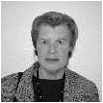News From California—Working with AIDS PatientsBy Marianne Benkert, MD See also 2010 Interview [Spring 2005; Vol. 31, No. 3; Pg 6, 13]  . .Several years have gone by since I last wrote for the Maryland Psychiatrist. Now I happily make contact with my colleagues in Baltimore from the beautiful jewel of the Pacific, La Jolla, California. I appreciate the invitation to share some thoughts with you in this column. I have had a long association with Baltimore, beginning in1967, when I arrived to complete a psychiatric residency program at Seton Institute. I stayed on for another 29 years, raising a family, and tending to a busy private practice. My involvement in the medical community that, of course, included the Maryland Psychiatric Society, was always a source of great satisfaction to me. Since our move in 1999, we have had many visitors; in January, Gerry Klee and his wife, Carol, joined the list of company from Baltimore. Richard and I hosted a dinner around our table, and we spent a delightful evening catching up on past and present activities of many old, mutual friends. Gerry expressed interest in my most recent career—working with AIDS patients at the University of California, San Diego. Dina Sokal invited me to share my experience with you. The University here has a large medical center, and is the only medical school between the Mexican border and Irvine, California. When I arrived here I received a joint academic appointment in the Departments of Medicine and Psychiatry. This allows me to work in the Owen Clinic where 2,700 HIV+/AIDS patients receive their primary care. What could be more removed from a private practice in North Baltimore County? Owen is a fast paced clinic with medical students, residents and fellows from all over the world. Internists and allied health professionals who have a special interest and expertise in treating AIDS patients staff the clinic. We have pharmacists who are experts in anti-retroviral(ARV) medications a nutritionist, health educator, substance abuse counselor, and benefits specialist. This is essentially a one-stop clinic and the director, Dr. Christopher Mathews has long appreciated the mental health needs of these patients. He recognized the importance of having psychiatric care on site, where the patients feel more comfortable and the primary care providers know there is a psychiatrist to consult nearby when needed. The psychiatrist is recognized as an integral part of the team. As a clinic psychiatrist, I am on hand to do psychiatric evaluations and medication management, and to act as consultant to the primary care physicians, who have become quite adept at diagnosing and prescribing some of the psychotropic medications. Many of these patients will never be seen by a psychiatrist. The more seriously mentally ill patients, however, such as the severely depressed suicidal patients, the non-responders, the unstable bipolar patients, and the ones with psychotic disorders are referred to a psychiatrist for management. Unfortunately, we do not have the time to provide much psychotherapy, but some important things can be accomplished in a 30-minute session with a motivated patient. I originally prepared myself for this new work by taking a one-week mini-residency course in AIDS treatment at the clinic. This essentially meant shadowing the primary care doctors and getting familiar with the patient population. I learned about T cells and viral loads that are used to track the progression of this illness. I heard about and saw some of the unusual opportunistic infections this population can acquire. I learned about the ARV medications and their combination in cocktails, and how they can raise or lower the blood levels of some of the psychiatric medications. It is very difficult for me to witness our patients’ many social problems. Many reach a point where they are unable to work, and have chronic financial stress plus housing and basic maintenance, problems. Drug and alcohol addictions complicate already difficult circumstances and are self-destructive. The use of crystal meth is a severe problem; it is especially common in San Diego, and is spreading rapidly elsewhere, contributing to the increased danger of infection. Many newly diagnosed HIV+ men tell me they have practiced promiscuous and unsafe sex while under the influence of this drug. Any kind of psychiatric problem is made worse by its use and the accompanying paranoia and mood swings are frightening. Compliance with ARV drugs becomes unreliable or non-existent, which is the worse possible situation because it increases the danger that the illness will develop resistance to commonly-used treatments. I have been immersed into a new world by my work with AIDS patients who have taught me about their lives. I have reaffirmed that human nature is constant and that the basic principles of good psychiatry are always the same—providing hope, care, and concern for the patient. I was moved, energized, and gratified when a patient who was struggling to regain his stability after being released from prison commented, almost with surprise, that I treated him with respect. He, like all of us, was striving for human dignity. I recently acquired THE PSYCHIATRY OF AIDS: a guide to diagnosis and treatment by Glenn J. Treisman, M.D, and Andrew F. Angelino, M.D. from Johns Hopkins. For me it is the definitive work on the subject. In my transition from Baltimore to San Diego, my AIDS work has been a professional bridge—I never would have imagined that I would be so grateful for the opportunity to have crossed it. |